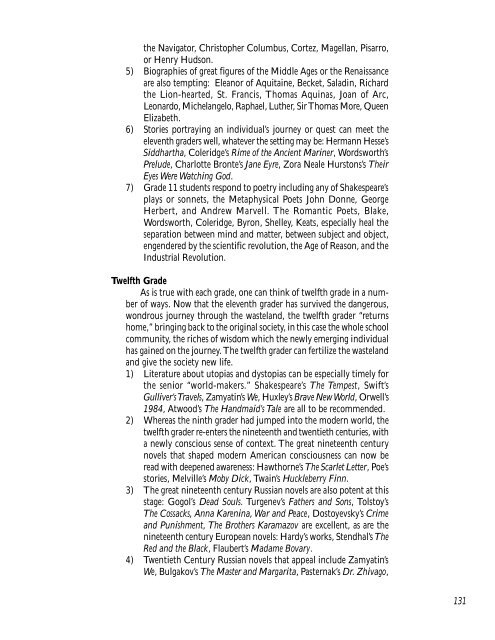Colloquium on English - Research Institute for Waldorf Education
Colloquium on English - Research Institute for Waldorf Education
Colloquium on English - Research Institute for Waldorf Education
You also want an ePaper? Increase the reach of your titles
YUMPU automatically turns print PDFs into web optimized ePapers that Google loves.
the Navigator, Christopher Columbus, Cortez, Magellan, Pisarro,<br />
or Henry Huds<strong>on</strong>.<br />
5) Biographies of great figures of the Middle Ages or the Renaissance<br />
are also tempting: Eleanor of Aquitaine, Becket, Saladin, Richard<br />
the Li<strong>on</strong>-hearted, St. Francis, Thomas Aquinas, Joan of Arc,<br />
Le<strong>on</strong>ardo, Michelangelo, Raphael, Luther, Sir Thomas More, Queen<br />
Elizabeth.<br />
6) Stories portraying an individual’s journey or quest can meet the<br />
eleventh graders well, whatever the setting may be: Hermann Hesse’s<br />
Siddhartha, Coleridge’s Rime of the Ancient Mariner, Wordsworth’s<br />
Prelude, Charlotte Br<strong>on</strong>te’s Jane Eyre, Zora Neale Hurst<strong>on</strong>s’s Their<br />
Eyes Were Watching God.<br />
7) Grade 11 students resp<strong>on</strong>d to poetry including any of Shakespeare’s<br />
plays or s<strong>on</strong>nets, the Metaphysical Poets John D<strong>on</strong>ne, George<br />
Herbert, and Andrew Marvell. The Romantic Poets, Blake,<br />
Wordsworth, Coleridge, Byr<strong>on</strong>, Shelley, Keats, especially heal the<br />
separati<strong>on</strong> between mind and matter, between subject and object,<br />
engendered by the scientific revoluti<strong>on</strong>, the Age of Reas<strong>on</strong>, and the<br />
Industrial Revoluti<strong>on</strong>.<br />
Twelfth Grade<br />
As is true with each grade, <strong>on</strong>e can think of twelfth grade in a number<br />
of ways. Now that the eleventh grader has survived the dangerous,<br />
w<strong>on</strong>drous journey through the wasteland, the twelfth grader “returns<br />
home,” bringing back to the original society, in this case the whole school<br />
community, the riches of wisdom which the newly emerging individual<br />
has gained <strong>on</strong> the journey. The twelfth grader can fertilize the wasteland<br />
and give the society new life.<br />
1) Literature about utopias and dystopias can be especially timely <strong>for</strong><br />
the senior “world-makers.” Shakespeare’s The Tempest, Swift’s<br />
Gulliver’s Travels, Zamyatin’s We, Huxley’s Brave New World, Orwell’s<br />
1984, Atwood’s The Handmaid’s Tale are all to be recommended.<br />
2) Whereas the ninth grader had jumped into the modern world, the<br />
twelfth grader re-enters the nineteenth and twentieth centuries, with<br />
a newly c<strong>on</strong>scious sense of c<strong>on</strong>text. The great nineteenth century<br />
novels that shaped modern American c<strong>on</strong>sciousness can now be<br />
read with deepened awareness: Hawthorne’s The Scarlet Letter, Poe’s<br />
stories, Melville’s Moby Dick, Twain’s Huckleberry Finn.<br />
3) The great nineteenth century Russian novels are also potent at this<br />
stage: Gogol’s Dead Souls. Turgenev’s Fathers and S<strong>on</strong>s, Tolstoy’s<br />
The Cossacks, Anna Karenina, War and Peace, Dostoyevsky’s Crime<br />
and Punishment, The Brothers Karamazov are excellent, as are the<br />
nineteenth century European novels: Hardy’s works, Stendhal’s The<br />
Red and the Black, Flaubert’s Madame Bovary.<br />
4) Twentieth Century Russian novels that appeal include Zamyatin’s<br />
We, Bulgakov’s The Master and Margarita, Pasternak’s Dr. Zhivago,<br />
131

















